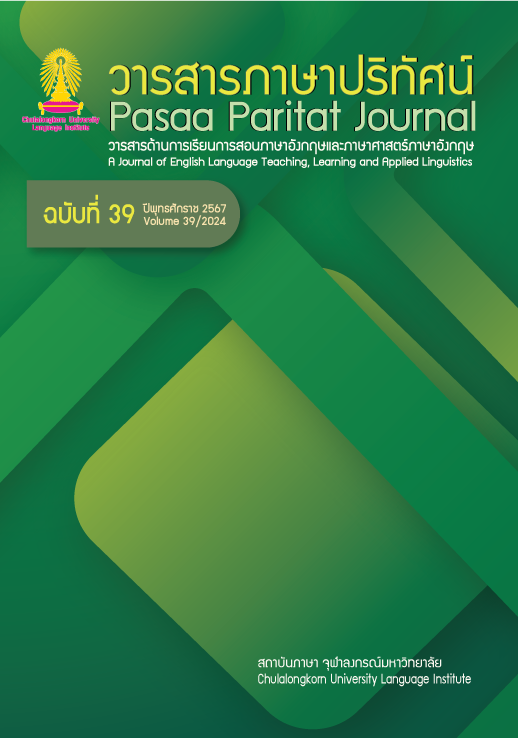A Development of Students' English Reading Skills through Task-Based Integrated with Virtual Camp
DOI:
https://doi.org/10.58837/CHULA.PPJ.39.7Keywords:
English Reading, Task-Based Integrated, Virtual Camp, Syntax, DiscourseAbstract
This action research aimed to enhance the reading comprehension abilities of teacher trainees, with the goal of achieving a CEFR (Common European Framework of Reference for Languages) B1 level of proficiency in the reading skill. The main objective of this research was to compare the average scores before and after using a cycle of task-based activities which were administered through a virtual camp with a total of 425 participants actively engaged in the development of their reading skills. The activities were organized into three distinct phases: pre-task, during the task, and post-task. The primary statistic for assessment was the average percentage of participants who achieved a B1 proficiency level in the CEFR test. In the initial placement test, only 1.2% of participants achieved the B1 level. Upon completing the first cycle of activities, the main problem was the participants’ limited range of vocabulary. Post-activity evaluation showed an improvement, with 13% of participants now attaining the B1 level. In the second cycle, syntactic knowledge posed a significant obstacle. After completing this phase, 33% of participants reached the B1 proficiency level. Finally, upon completion of the final cycle, which focused on issues related to discourse, 55% of the participants achieved the B1 level.
References
ขวัญเกล้า ศรีโสภา. (2562). การจัดการเรียนรู้ด้วยเทคนิค CIRC เพื่อเสริมสร้างทักษะการอ่านและการเขียนภาษาอังกฤษเพื่อการสื่อสารในศตวรรษที่ 21 สำหรับนักศึกษาครู. วารสารวิชาการเครือข่ายบัณฑิตศึกษามหาวิทยาลัยราชภัฏภาคเหนือ. 9(2), 93–106. https://so02.tci-thaijo.org/index.php/JGNRU/article/view/226054/162177
ณฐมน วงศ์ทาทอง. (2560). การพัฒนาความสามารถในการอ่านภาษาอังกฤษเพื่อความเข้าใจ ด้วยวิธีสอนอ่านแบบ SQ3R โดยใช้ข้อมูลอาเซียน สำหรับนักเรียนชั้นประถมศึกษาปีที่ 6 [วิทยานิพนธ์ศึกษาศาสตรมหาบัณฑิต, มหาวิทยาลัยศิลปากร]. http://ithesis-ir.su.ac.th/dspace/bitstream/123456789/1394/1/56253305.pdf
นิตยา ฉิมวงศ์. (2551). การเปรียบเทียบความสามารถในการคิดอย่างมีวิจารณญาณและผลสัมฤทธิ์ทางการเรียนกลุ่มสาระการเรียนรู้คณิตศาสตร์ เรื่อง ความน่าจะเป็น ของนักเรียนชั้นมัธยมศึกษาปีที่ 3 ที่ได้รับการสอนโดยใช้รูปแบบการเรียนรู้ตามทฤษฎีคอนสตรัคติวิสต์และการสอนตามปกติ [วิทยานิพนธ์ปริญญามหาบัณฑิต, มหาวิทยาลัยมหาสารคาม].
นภัสสร ทองเจิม. (2561). ผลการใช้กลวิธีอภิปัญญาเพื่อส่งเสริมความเข้าใจในการอ่านภาษาอังกฤษและความสามารถในการคิดอย่างมีวิจารณญาณของนักเรียนชั้นประถมศึกษาปีที่ 4 โรงเรียนเทศบาลหางดง จังหวัดเชียงใหม่ [วิทยานิพนธ์ศึกษาศาสตรมหาบัณฑิต, มหาวิทยาลัยเชียงใหม่].
สุมาลี ชัยเจริญ. (2551). เทคโนโลยีการศึกษา หลักการ ทฤษฎี สู่การปฏิบัติ. โรงพิมพ์คลังนานาวิทยา.
อรอุมา ธรรมวันนา. (2551). ผลการเรียน เรื่อง การใช้โปรแกรมตารางทำงานของนักเรียนชั้นประถมศึกษาปีที่ 6 ระหว่างการเรียนบนเครือข่ายที่สร้างตามแนวทฤษฎีคอนสตรัคติวิสต์กับการเรียนปกติ [วิทยานิพนธ์ปริญญามหาบัณฑิต, มหาวิทยาลัยมหาสารคาม].
Alderson, J. C. (2000). Assessing reading. Cambridge.
Anderson, N. (2009). Active reading: The research base for a pedagogical approach in the reading classroom. In Z. H. Han & N. Anderson (Eds.), Second language reading: Research and instruction (pp. 117–143). University of Michigan Press.
Bowey, J. A. (2005). Predicting individual differences in learning to read. In M. J. Snowling & C. Hulme (Eds.), The science of reading: A handbook (pp. 155–172). Blackwell Publishing. https://doi.org/10.1002/9780470757642.ch9
Bråten, I. (2007). Leseforståelse-komponenter, vansker og tiltak. In Leseforståelse (pp. 45–81). Cappelen.
Callahan, J. F. & Clark, L. H. (1988). Teaching in the middle and secondary schools (3rd ed.). Macmillan.
Candlin, C. (1987). Toward task-based language learning. In C. Candlin, & D. Murphy (Eds.) (pp. 5–22), language learning tasks. Prentice Hall.
DeKeyser, R. (ed.) (2007). Practice in a Second Language: Perspectives from Applied Linguistics and Cognitive Psychology. Cambridge University Press.
Grabe, W. (1999). Developments in reading research and their implications for computer adaptive reading assessment. In M. Chalhoub-Deville (Ed.), Issues in computer-adaptive testing of reading proficiency (pp. 11–47). Cambridge University Press.
Koda, K. (2005). Insights into second language reading: A cross-linguistic approach. Cambridge University Press.
Loman, N., & Mayer, R. (1983). Signaling techniques that increase the understandability of expository prose. Journal of Educational Psychology, 75(3), 402–412. https://doi.org/10.1037/0022-0663.75.3.402
Institute for Career Studies. (2021, February 11). 3 technologies that are making education more accessible. https://www.icscareergps.com/blog/blog-post/education-and-career-news-trends-from-around-the-world-february-11th-2021/
Nagy, W. (2007). Metalinguistic awareness and the vocabulary-comprehension connection. In R. K. Wagner, A. E. Muse, & K. R. Tannenbaum (Eds.), Vocabulary acquisition: Implications for reading comprehension (pp. 52–77). The Guilford Press.
Nation, K., & Snowling, M. J. (2000). Factors influencing syntactic awareness skills in normal readers and poorcomprehenders. Applied Psycholinguistics, 21(2), 229–241. https://doi.org/10.1017/S0142716400002046
Ngabut, M. N. (2015). Reading theories and reading comprehension. Journal on English as a Foreign Language, 5(1), 25–36. https://dx.doi.org/10.23971/jefl.v5i1.89
Nunan, D. (1985). Designing tasks for the communicative classroom. Cambridge University Press
Prabhu, N. S. (1987). Second language pedagogy. Oxford University Press.
Richards, J. (1984). The context of language teaching. Cambridge University Press.
Sideridis, G. D, Mouzaki, A., Simos, P., Protopapas, A. (2006). Classification of students with reading comprehension difficulties: The roles of motivation, affect, and psychopathology. Learning Disability Quarterly, 29(3), 159–180. https://doi.org/10.2307/30035505
Skehan, P. (1996). A framework for implementation of task-based instruction. Applied Linguistic. 17(1), 38–62. https://doi.org/10.1093/applin/17.1.38
Snow, C. E., Griffin, P., & Burns, M. S. (Eds.). (2005). Knowledge to support the teaching of reading. Jossey-Bass.
Valette, R. M. & Disick, R. S. (1972). Modern language performance object and individualization. Harcourt Brace Jovanovich.
Vygotsky, L. S. (1978). Mind in society: The development of higher psychological processes. Harvard University Press.
Walker, G., Weidenbenner, J. V. (2019). Social and emotional learning in the age of virtual play: Technology, empathy, and learning. Journal of Research in Innovative Teaching & Learning, 12(2), 116–132. https:// https://doi.org/10.1108/JRIT-03-2019-0046
Willis, J. (1996). A Framework for task-based learning. De Henseler Books Publishers.
Downloads
Published
How to Cite
Issue
Section
License
Copyright (c) 2024 Pasaa Paritat Journal

This work is licensed under a Creative Commons Attribution-NonCommercial-NoDerivatives 4.0 International License.



